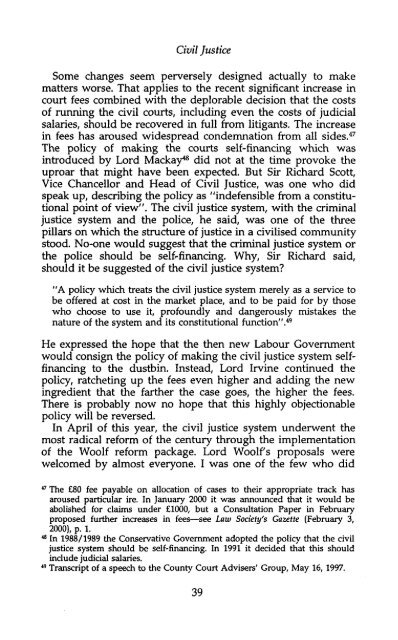HAMLYN - College of Social Sciences and International Studies ...
HAMLYN - College of Social Sciences and International Studies ...
HAMLYN - College of Social Sciences and International Studies ...
Create successful ePaper yourself
Turn your PDF publications into a flip-book with our unique Google optimized e-Paper software.
Civil Justice<br />
Some changes seem perversely designed actually to make<br />
matters worse. That applies to the recent significant increase in<br />
court fees combined with the deplorable decision that the costs<br />
<strong>of</strong> running the civil courts, including even the costs <strong>of</strong> judicial<br />
salaries, should be recovered in full from litigants. The increase<br />
in fees has aroused widespread condemnation from all sides. 47<br />
The policy <strong>of</strong> making the courts self-financing which was<br />
introduced by Lord Mackay 48 did not at the time provoke the<br />
uproar that might have been expected. But Sir Richard Scott,<br />
Vice Chancellor <strong>and</strong> Head <strong>of</strong> Civil Justice, was one who did<br />
speak up, describing the policy as "indefensible from a constitutional<br />
point <strong>of</strong> view". The civil justice system, with the criminal<br />
justice system <strong>and</strong> the police, he said, was one <strong>of</strong> the three<br />
pillars on which the structure <strong>of</strong> justice in a civilised community<br />
stood. No-one would suggest that the criminal justice system or<br />
the police should be self-financing. Why, Sir Richard said,<br />
should it be suggested <strong>of</strong> the civil justice system?<br />
"A policy which treats the civil justice system merely as a service to<br />
be <strong>of</strong>fered at cost in the market place, <strong>and</strong> to be paid for by those<br />
who choose to use it, pr<strong>of</strong>oundly <strong>and</strong> dangerously mistakes the<br />
nature <strong>of</strong> the system <strong>and</strong> its constitutional function". 49<br />
He expressed the hope that the then new Labour Government<br />
would consign the policy <strong>of</strong> making the civil justice system selffinancing<br />
to the dustbin. Instead, Lord Irvine continued the<br />
policy, ratcheting up the fees even higher <strong>and</strong> adding the new<br />
ingredient that the farther the case goes, the higher the fees.<br />
There is probably now no hope that this highly objectionable<br />
policy will be reversed.<br />
In April <strong>of</strong> this year, the civil justice system underwent the<br />
most radical reform <strong>of</strong> the century through the implementation<br />
<strong>of</strong> the Woolf reform package. Lord Woolf's proposals were<br />
welcomed by almost everyone. I was one <strong>of</strong> the few who did<br />
47 The £80 fee payable on allocation <strong>of</strong> cases to their appropriate track has<br />
aroused particular ire. In January 2000 it was announced that it would be<br />
abolished for claims under £1000, but a Consultation Paper in February<br />
proposed further increases in fees—see Law Society's Gazette (February 3,<br />
2000), p. 1.<br />
48 In 1988/1989 the Conservative Government adopted the policy that the civil<br />
justice system should be self-financing. In 1991 it decided that this should<br />
include judicial salaries.<br />
49 Transcript <strong>of</strong> a speech to the County Court Advisers' Group, May 16, 1997.<br />
39

















